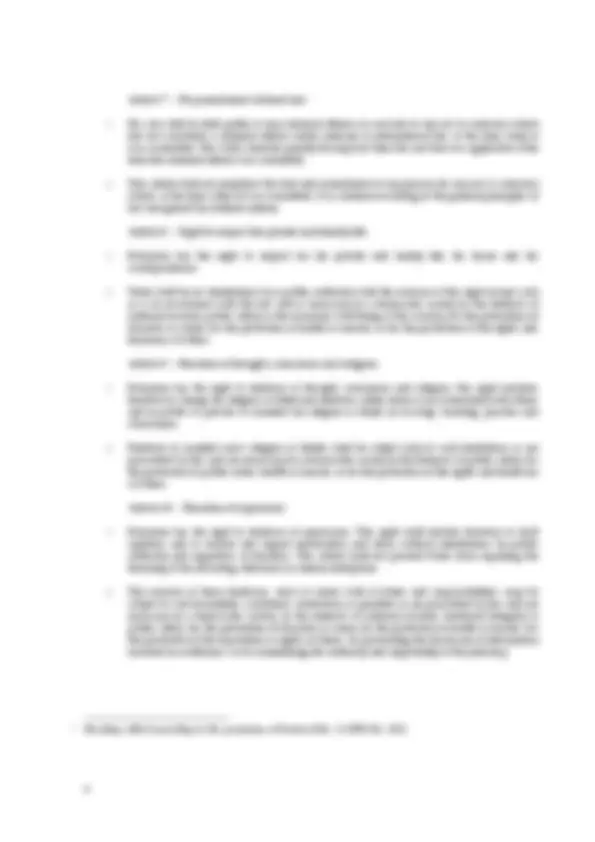











Study with the several resources on Docsity

Earn points by helping other students or get them with a premium plan


Prepare for your exams
Study with the several resources on Docsity

Earn points to download
Earn points by helping other students or get them with a premium plan
Community
Ask the community for help and clear up your study doubts
Discover the best universities in your country according to Docsity users
Free resources
Download our free guides on studying techniques, anxiety management strategies, and thesis advice from Docsity tutors
The amendments made to the European Convention on Human Rights through various protocols, including Protocol No. 11. articles on the obligation to respect human rights, freedom to manifest religion or beliefs, effective remedy, prohibition of abuse of rights, jurisdiction of the Court, inter-state cases, individual applications, and exclusion of other means of dispute settlement.
Typology: Summaries
1 / 16

This page cannot be seen from the preview
Don't miss anything!










European Treaty Series - No. 5
The text of the Convention had been amended according to the provisions of Protocol No. 3 (ETS No. 45), which entered into force on 21 September 1970, of Protocol No. 5 (ETS No. 55), which entered into force on 20 December 1971 and of Protocol No. 8 (ETS No. 118), which entered into force on 1 January 1990, and comprised also the text of Protocol No. 2 (ETS No. 44) which, in accordance with Article 5, paragraph 3 thereof, had been an integral part of the Convention since its entry into force on 21 September 1970. All provisions which had been amended or added by these Protocols are replaced by Protocol No. 11 (ETS No. 155), as from the date of its entry into force on 1 November 1998. As from that date, Protocol No. 9 (ETS No. 140), which entered into force on 1 October 1994, is repealed and Protocol No. 10 (ETS no. 146) has lost its purpose.
The governments signatory hereto, being members of the Council of Europe,
Considering the Universal Declaration of Human Rights proclaimed by the General Assembly of the United Nations on 10th December 1948;
Considering that this Declaration aims at securing the universal and effective recognition and observance of the Rights therein declared;
Considering that the aim of the Council of Europe is the achievement of greater unity between its members and that one of the methods by which that aim is to be pursued is the maintenance and further realisation of human rights and fundamental freedoms;
Reaffirming their profound belief in those fundamental freedoms which are the foundation of justice and peace in the world and are best maintained on the one hand by an effective political democracy and on the other by a common understanding and observance of the human rights upon which they depend;
Being resolved, as the governments of European countries which are like-minded and have a common heritage of political traditions, ideals, freedom and the rule of law, to take the first steps for the collective enforcement of certain of the rights stated in the Universal Declaration,
Have agreed as follows:
Article 1^1 – Obligation to respect human rights
The High Contracting Parties shall secure to everyone within their jurisdiction the rights and freedoms defined in Section I of this Convention.
Section I^1 – Rights and freedoms
Article 2^1 – Right to life
1 Everyone's right to life shall be protected by law. No one shall be deprived of his life intentionally save in the execution of a sentence of a court following his conviction of a crime for which this penalty is provided by law.
2 Deprivation of life shall not be regarded as inflicted in contravention of this article when it results from the use of force which is no more than absolutely necessary:
a in defence of any person from unlawful violence;
b in order to effect a lawful arrest or to prevent the escape of a person lawfully detained;
c in action lawfully taken for the purpose of quelling a riot or insurrection.
(^1) Heading added according to the provisions of Protocol No. 11 (ETS No. 155).
2 Everyone who is arrested shall be informed promptly, in a language which he understands, of the reasons for his arrest and of any charge against him.
3 Everyone arrested or detained in accordance with the provisions of paragraph 1.c of this article shall be brought promptly before a judge or other officer authorised by law to exercise judicial power and shall be entitled to trial within a reasonable time or to release pending trial. Release may be conditioned by guarantees to appear for trial.
4 Everyone who is deprived of his liberty by arrest or detention shall be entitled to take proceedings by which the lawfulness of his detention shall be decided speedily by a court and his release ordered if the detention is not lawful.
5 Everyone who has been the victim of arrest or detention in contravention of the provisions of this article shall have an enforceable right to compensation.
Article 6^1 – Right to a fair trial
1 In the determination of his civil rights and obligations or of any criminal charge against him, everyone is entitled to a fair and public hearing within a reasonable time by an independent and impartial tribunal established by law. Judgment shall be pronounced publicly but the press and public may be excluded from all or part of the trial in the interests of morals, public order or national security in a democratic society, where the interests of juveniles or the protection of the private life of the parties so require, or to the extent strictly necessary in the opinion of the court in special circumstances where publicity would prejudice the interests of justice.
2 Everyone charged with a criminal offence shall be presumed innocent until proved guilty according to law.
3 Everyone charged with a criminal offence has the following minimum rights:
a to be informed promptly, in a language which he understands and in detail, of the nature and cause of the accusation against him;
b to have adequate time and facilities for the preparation of his defence;
c to defend himself in person or through legal assistance of his own choosing or, if he has not sufficient means to pay for legal assistance, to be given it free when the interests of justice so require;
d to examine or have examined witnesses against him and to obtain the attendance and examination of witnesses on his behalf under the same conditions as witnesses against him;
e to have the free assistance of an interpreter if he cannot understand or speak the language used in court.
(^1) Heading added according to the provisions of Protocol No. 11 (ETS No. 155).
Article 7^1 – No punishment without law
1 No one shall be held guilty of any criminal offence on account of any act or omission which did not constitute a criminal offence under national or international law at the time when it was committed. Nor shall a heavier penalty be imposed than the one that was applicable at the time the criminal offence was committed.
2 This article shall not prejudice the trial and punishment of any person for any act or omission which, at the time when it was committed, was criminal according to the general principles of law recognised by civilised nations.
Article 8^1 – Right to respect for private and family life
1 Everyone has the right to respect for his private and family life, his home and his correspondence.
2 There shall be no interference by a public authority with the exercise of this right except such as is in accordance with the law and is necessary in a democratic society in the interests of national security, public safety or the economic well-being of the country, for the prevention of disorder or crime, for the protection of health or morals, or for the protection of the rights and freedoms of others.
Article 9^1 – Freedom of thought, conscience and religion
1 Everyone has the right to freedom of thought, conscience and religion; this right includes freedom to change his religion or belief and freedom, either alone or in community with others and in public or private, to manifest his religion or belief, in worship, teaching, practice and observance.
2 Freedom to manifest one's religion or beliefs shall be subject only to such limitations as are prescribed by law and are necessary in a democratic society in the interests of public safety, for the protection of public order, health or morals, or for the protection of the rights and freedoms of others.
Article 10^1 – Freedom of expression
1 Everyone has the right to freedom of expression. This right shall include freedom to hold opinions and to receive and impart information and ideas without interference by public authority and regardless of frontiers. This article shall not prevent States from requiring the licensing of broadcasting, television or cinema enterprises.
2 The exercise of these freedoms, since it carries with it duties and responsibilities, may be subject to such formalities, conditions, restrictions or penalties as are prescribed by law and are necessary in a democratic society, in the interests of national security, territorial integrity or public safety, for the prevention of disorder or crime, for the protection of health or morals, for the protection of the reputation or rights of others, for preventing the disclosure of information received in confidence, or for maintaining the authority and impartiality of the judiciary.
(^1) Heading added according to the provisions of Protocol No. 11 (ETS No. 155).
Article 17^1 – Prohibition of abuse of rights
Nothing in this Convention may be interpreted as implying for any State, group or person any right to engage in any activity or perform any act aimed at the destruction of any of the rights and freedoms set forth herein or at their limitation to a greater extent than is provided for in the Convention.
Article 18^1 – Limitation on use of restrictions on rights
The restrictions permitted under this Convention to the said rights and freedoms shall not be applied for any purpose other than those for which they have been prescribed.
Section II^2 – European Court of Human Rights
Article 19 – Establishment of the Court
To ensure the observance of the engagements undertaken by the High Contracting Parties in the Convention and the Protocols thereto, there shall be set up a European Court of Human Rights, hereinafter referred to as "the Court". It shall function on a permanent basis.
Article 20 – Number of judges
The Court shall consist of a number of judges equal to that of the High Contracting Parties. Article 21 – Criteria for office
1 The judges shall be of high moral character and must either possess the qualifications required for appointment to high judicial office or be jurisconsults of recognised competence.
2 The judges shall sit on the Court in their individual capacity.
3 During their term of office the judges shall not engage in any activity which is incompatible with their independence , impartiality or with the demands of a full-time office; all questions arising from the application of this paragraph shall be decided by the Court.
Article 22 – Election of judges
1 The judges shall be elected by the Parliamentary Assembly with respect to each High Contracting Party by a majority of votes cast from a list of three candidates nominated by the High Contracting Party.
2 The same procedure shall be followed to complete the Court in the event of the accession of new High Contracting Parties and in filling casual vacancies.
(^1) Heading added according to the provisions of Protocol No. 11 (ETS No. 155).
(^2) New Section II according to the provisions of Protocol No. 11 (ETS No. 155).
Article 23 – Terms of office
1 The judges shall be elected for a period of six years. They may be re-elected. However, the terms of office of one-half of the judges elected at the first election shall expire at the end of three years.
2 The judges whose terms of office are to expire at the end of the initial period of three years shall be chosen by lot by the Secretary General of the Council of Europe immediately after their election.
3 In order to ensure that, as far as possible, the terms of office of one-half of the judges are renewed every three years, the Parliamentary Assembly may decide, before proceeding to any subsequent election, that the term or terms of office of one or more judges to be elected shall be for a period other than six years but not more than nine and not less than three years.
4 In cases where more than one term of office is involved and where the Parliamentary Assembly applies the preceding paragraph, the allocation of the terms of office shall be effected by a drawing of lots by the Secretary General of the Council of Europe immediately after the election.
5 A judge elected to replace a judge whose term of office has not expired shall hold office for the remainder of his predecessor's term.
6 The terms of office of judges shall expire when they reach the age of 70.
7 The judges shall hold office until replaced. They shall, however, continue to deal with such cases as they already have under consideration.
Article 24 – Dismissal
No judge may be dismissed from his office unless the other judges decide by a majority of two- thirds that he has ceased to fulfil the required conditions.
Article 25 – Registry and legal secretaries
The Court shall have a registry, the functions and organisation of which shall be laid down in the rules of the Court. The Court shall be assisted by legal secretaries.
Article 26 – Plenary Court
The plenary Court shall
a elect its President and one or two Vice-Presidents for a period of three years; they may be re-elected;
b set up Chambers, constituted for a fixed period of time;
c elect the Presidents of the Chambers of the Court; they may be re-elected;
d adopt the rules of the Court, and
e elect the Registrar and one or more Deputy Registrars.
Article 32 – Jurisdiction of the Court
1 The jurisdiction of the Court shall extend to all matters concerning the interpretation and application of the Convention and the protocols thereto which are referred to it as provided in Articles 33, 34 and 47.
2 In the event of dispute as to whether the Court has jurisdiction, the Court shall decide.
Article 33 – Inter-State cases
Any High Contracting Party may refer to the Court any alleged breach of the provisions of the Convention and the protocols thereto by another High Contracting Party.
Article 34 – Individual applications
The Court may receive applications from any person, non-governmental organisation or group of individuals claiming to be the victim of a violation by one of the High Contracting Parties of the rights set forth in the Convention or the protocols thereto. The High Contracting Parties undertake not to hinder in any way the effective exercise of this right.
Article 35 – Admissibility criteria
1 The Court may only deal with the matter after all domestic remedies have been exhausted, according to the generally recognised rules of international law, and within a period of six months from the date on which the final decision was taken.
2 The Court shall not deal with any application submitted under Article 34 that
a is anonymous; or
b is substantially the same as a matter that has already been examined by the Court or has already been submitted to another procedure of international investigation or settlement and contains no relevant new information.
3 The Court shall declare inadmissible any individual application submitted under Article 34 which it considers incompatible with the provisions of the Convention or the protocols thereto, manifestly ill-founded, or an abuse of the right of application.
4 The Court shall reject any application which it considers inadmissible under this Article. It may do so at any stage of the proceedings.
Article 36 – Third party intervention
1 In all cases before a Chamber or the Grand Chamber, a High Contracting Party one of whose nationals is an applicant shall have the right to submit written comments and to take part in hearings.
2 The President of the Court may, in the interest of the proper administration of justice, invite any High Contracting Party which is not a party to the proceedings or any person concerned who is not the applicant to submit written comments or take part in hearings.
Article 37 – Striking out applications
1 The Court may at any stage of the proceedings decide to strike an application out of its list of cases where the circumstances lead to the conclusion that
a the applicant does not intend to pursue his application; or
b the matter has been resolved; or
c for any other reason established by the Court, it is no longer justified to continue the examination of the application.
However, the Court shall continue the examination of the application if respect for human rights as defined in the Convention and the protocols thereto so requires.
2 The Court may decide to restore an application to its list of cases if it considers that the circumstances justify such a course.
Article 38 – Examination of the case and friendly settlement proceedings
1 If the Court declares the application admissible, it shall
a pursue the examination of the case, together with the representatives of the parties, and if need be, undertake an investigation, for the effective conduct of which the States concerned shall furnish all necessary facilities;
b place itself at the disposal of the parties concerned with a view to securing a friendly settlement of the matter on the basis of respect for human rights as defined in the Convention and the protocols thereto.
2 Proceedings conducted under paragraph 1.b shall be confidential.
Article 39 – Finding of a friendly settlement
If a friendly settlement is effected, the Court shall strike the case out of its list by means of a decision which shall be confined to a brief statement of the facts and of the solution reached.
Article 40 – Public hearings and access to documents
1 Hearings shall be in public unless the Court in exceptional circumstances decides otherwise.
2 Documents deposited with the Registrar shall be accessible to the public unless the President of the Court decides otherwise.
Article 41 – Just satisfaction
If the Court finds that there has been a violation of the Convention or the protocols thereto, and if the internal law of the High Contracting Party concerned allows only partial reparation to be made, the Court shall, if necessary, afford just satisfaction to the injured party.
Article 42 – Judgments of Chambers
Judgments of Chambers shall become final in accordance with the provisions of Article 44, paragraph 2.
Convention.
3 Decisions of the Committee of Ministers to request an advisory opinion of the Court shall require a majority vote of the representatives entitled to sit on the Committee.
Article 48 – Advisory jurisdiction of the Court
The Court shall decide whether a request for an advisory opinion submitted by the Committee of Ministers is within its competence as defined in Article 47.
Article 49 – Reasons for advisory opinions
1 Reasons shall be given for advisory opinions of the Court.
2 If the advisory opinion does not represent, in whole or in part, the unanimous opinion of the judges, any judge shall be entitled to deliver a separate opinion.
3 Advisory opinions of the Court shall be communicated to the Committee of Ministers.
Article 50 – Expenditure on the Court
The expenditure on the Court shall be borne by the Council of Europe.
Article 51 – Privileges and immunities of judges
The judges shall be entitled, during the exercise of their functions, to the privileges and immunities provided for in Article 40 of the Statute of the Council of Europe and in the agreements made thereunder.
Section III 1,2^ – Miscellaneous provisions
Article 52^1 – Inquiries by the Secretary General
On receipt of a request from the Secretary General of the Council of Europe any High Contracting Party shall furnish an explanation of the manner in which its internal law ensures the effective implementation of any of the provisions of the Convention.
Article 53^1 – Safeguard for existing human rights
Nothing in this Convention shall be construed as limiting or derogating from any of the human rights and fundamental freedoms which may be ensured under the laws of any High Contracting Party or under any other agreement to which it is a Party.
Article 54^1 – Powers of the Committee of Ministers
Nothing in this Convention shall prejudice the powers conferred on the Committee of Ministers by the Statute of the Council of Europe.
(^1) Heading added according to the provisions of Protocol No. 11 (ETS No. 155).
(^2) The articles of this Section are renumbered according to the provisions of Protocol No. 11 (ETS No. 155).
3 Any High Contracting Party which shall cease to be a member of the Council of Europe shall cease to be a Party to this Convention under the same conditions.
41 The Convention may be denounced in accordance with the provisions of the preceding paragraphs in respect of any territory to which it has been declared to extend under the terms of Article 56.
Article 59^2 – Signature and ratification
1 This Convention shall be open to the signature of the members of the Council of Europe. It shall be ratified. Ratifications shall be deposited with the Secretary General of the Council of Europe.
2 The present Convention shall come into force after the deposit of ten instruments of ratification.
3 As regards any signatory ratifying subsequently, the Convention shall come into force at the date of the deposit of its instrument of ratification.
4 The Secretary General of the Council of Europe shall notify all the members of the Council of Europe of the entry into force of the Convention, the names of the High Contracting Parties who have ratified it, and the deposit of all instruments of ratification which may be effected subsequently.
Done at Rome this 4th day of November 1950, in English and French, both texts being equally authentic, in a single copy which shall remain deposited in the archives of the Council of Europe. The Secretary General shall transmit certified copies to each of the signatories.
(^1) Text amended according to the provisions of Protocol No. 11 (ETS No. 155).
(^2) Heading added according to the provisions of Protocol No. 11 (ETS No. 155).